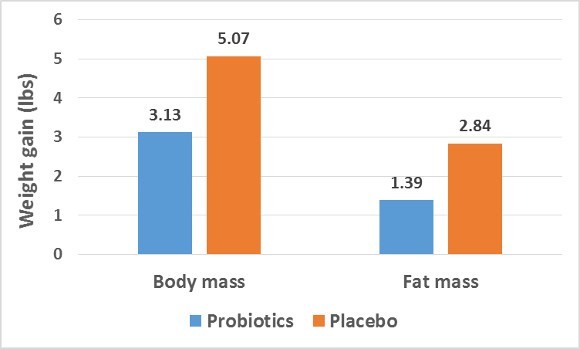 Probiotics are live microorganisms that have health benefits when eaten (1).
Probiotics are live microorganisms that have health benefits when eaten (1).They are found in both supplements and fermented foods.
Probiotics may improve digestive health, heart health and immune function, to name a few (2,3, 4, 5).
Several studies also suggest that probiotics can help you lose weight and belly fat.
Gut Bacteria May Affect Body Weight Regulation
There are hundreds of different microorganisms in your digestive system.
The majority of these are bacteria, most of which are friendly. Friendly bacteria produce several important nutrients, including vitamin K and certain B-vitamins.
They also help break down fiber that the body can’t digest, turning it into beneficial short-chain fatty acids like butyrate (6).
There are two main families of good bacteria in the gut: bacteroidetes and firmicutes. Body weight seems be related to the balance of these two families of bacteria (7, 8).
Both human and animal studies have found that normal-weight people have different gut bacteria than overweight or obese people (9, 10, 11).
In those studies, people with obesity had more firmicutes and fewer bacteroidetes, compared to normal-weight people.
There are also some animal studies showing that when the gut bacteria from obese mice are transplanted into guts of lean mice, the lean mice get fat (11).
All of these studies suggest that gut bacteria may play a powerful role in weight regulation.
Bottom Line: There are many different microorganisms in the gut, mostly bacteria. Several lines of evidence suggest that these gut bacteria can have powerful effects on body weight.
How Can Probiotics Affect Changes in Weight?
It is thought that certain probiotics may inhibit the absorption of dietary fat, increasing the amount of fat excreted with feces (12).
In other words, they make you “harvest” fewer calories from the foods in your diet.
Certain bacteria, such as those from the Lactobacillus family, have been found to function in this way (12, 13).
Probiotics may also fight obesity in other ways:
- Release of GLP-1: Probiotics may help release the satiety (appetite-reducing) hormone GLP-1. Increased levels of this hormone may help you burn calories and fat (14, 15).
- Increase of ANGPTL4: Probiotics may increase levels of the protein ANGPTL4. This may lead to decreased fat storage (16).
There is also a lot of evidence that obesity is linked to inflammation in the brain. By improving gut health, probiotics may reduce systemic inflammation and protect against obesity and other diseases (17, 18).
However, it is important to keep in mind that these mechanisms aren’t understood very well. More research is needed.
Bottom Line: Probiotics may reduce the number of calories you absorb from food. They also affect hormones and proteins related to appetite and fat storage. They may also reduce inflammation, which can drive obesity.
Probiotics May Help You Lose Weight and Belly Fat
Studies have found that certain strains of theLactobacillus family can help you lose weight and belly fat.
In one study, eating yogurt with Lactobacillus fermentum or Lactobacillus amylovorus reduced body fat by 3–4% over a 6-week period (19).
Another study of 125 overweight dieters investigated the effects of Lactobacillus rhamnosus supplements on weight loss and weight maintenance (20).
During a 3-month study period, the women taking the probiotics lost 50% more weight compared to the group taking a dummy pill (placebo). They also continued to lose weight during the weight maintenance phase of the study.
Lactobacillus Gasseri
Of all the probiotic bacteria studied to date, Lactobacillus gasseri shows the most promising effects on weight loss. Numerous studies in rodents have found that it has anti-obesity effects (13, 21, 22, 23).
Additionally, studies in Japanese adults have shown impressive results (12, 24, 25).
One study followed 210 people with a lot of belly fat. It found that taking Lactobacillus gasseri for 12 weeks reduced body weight, fat around organs, BMI, waist size and hip circumference.
What’s more, belly fat was reduced by 8.5%. However, when participants stopped taking the probiotic, they gained back all of the belly fat within a month (25).
Bottom Line: Some strains of the Lactobacillus family have been shown to reduce weight and belly fat. Lactobacillus gasseri appears to be the most effective.
Some Probiotics May Prevent Weight Gain
Losing weight is not the only way to fight obesity. Prevention is even more important, as in preventing the weight from accumulating in the first place.
In one 4-week study, taking a probiotic formulation called VSL#3 reduced weight gain and fat gain on a diet where people were overfed by 1000 calories per day (26).
On this graph, you can see how the probiotic group gained significantly less fat:
This indicates that some probiotic strains might be effective at preventing weight gain in the context of a high-calorie diet. However, this needs to be studied a lot more.
Bottom Line: Certain probiotic strains may be able to prevent weight gain on a high-calorie diet.
Some Probiotic Strains May Increase the Risk of Weight Gain and Obesity
Not all studies have found that probiotics help with weight loss.
Some studies have even found that certain probiotic strains might lead to weight gain, not loss. This includes Lactobacillus acidophilus, Lactobacillus fermentum andLactobacillus ingluviei (27).
One recent study reviewed 4 controlled clinical trials. It concluded that probiotics did not reduce body weight, BMI or body fat levels in overweight or obese adults (28).
However, this review study did not include many of the studies mentioned above.
Bottom Line: Not all probiotics help with weight loss, and some of them may even cause weight gain. The effects depend on the probiotic strain, and may also vary between individuals.
Probiotics May be One Part of The Puzzle
Probiotics offer a wide range of health benefits.
However, their effects on weight are mixed, and seem to depend on the type of probiotic.
Evidence indicates that Lactobacillus gasseri may help people with obesity lose weight and belly fat. Additionally, a blend of probiotics called VSL#3 may reduce weight gain on a high-calorie diet.
If you are interested in trying them out, both Lactobacillus gasseri and VSL#3 are available on Amazon.
At the end of the day, certain types of probiotics may have modest effects on your weight, especially when combined with a healthy, real food-based diet.
However, there are many other reasons to take a probiotic supplement besides weight loss.
They can improve digestive health, reduce inflammation, improve cardiovascular risk factors and even help fight depression and anxiety.
For more evidence-based info on probiotics and their health benefits, read this article.




This comment has been removed by a blog administrator.
ReplyDelete